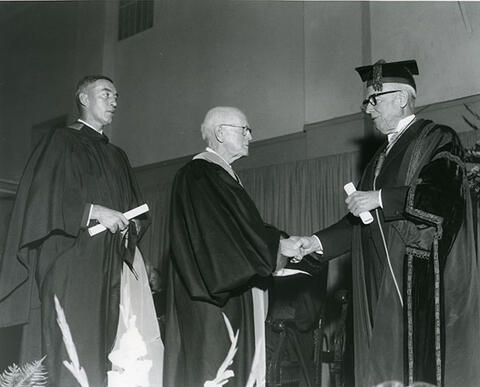
Title and statement of responsibility area
Titel
Honourary Degrees - Presentation - Frank H. Underhill
Algemene aanduiding van het materiaal
- Graphic material
Parallelle titel
Overige titelinformatie
Title statements of responsibility
Titel aantekeningen
Beschrijvingsniveau
Stuk
archiefbewaarplaats
referentie code
Editie
Editie
Edition statement of responsibility
Class of material specific details area
Statement of scale (cartographic)
Statement of projection (cartographic)
Statement of coordinates (cartographic)
Statement of scale (architectural)
Issuing jurisdiction and denomination (philatelic)
Datering archiefvorming
Datum(s)
-
1962 (Vervaardig)
Fysieke beschrijving
Fysieke beschrijving
1 photograph : b&w ; 25.5 x 20.5 cm
1 negative : col. ; 12.5 x 10.0 cm
Publisher's series area
Title proper of publisher's series
Parallel titles of publisher's series
Other title information of publisher's series
Statement of responsibility relating to publisher's series
Numbering within publisher's series
Note on publisher's series
Archivistische beschrijving
Naam van de archiefvormer
Geschiedenis beheer
Bereik en inhoud
F. Hedley Auld, University Chancellor, making presentation of an honourary Doctor of Laws degree to Frank H. Underhill, professor of History from 1914-1927, during Convocation held in Physical Education gymnasium. Norman K. Cram, University Registrar, waits to hood recipient.
Bio/Historical Note: Frank Hawkins Underhill was born in 1889 in Stouffville, Ontario, He was educated at the University of Toronto and the University of Oxford where he was a member of the Fabian Society. He was influenced by social and political critics such as Bernard Shaw and Goldwin Smith. He taught history at the University of Saskatchewan from 1914 until 1927 with a long interruption during World War I during which he served as an officer in the Hertfordshire Regiment of the British Army on the Western Front. He also taught from 1927 until 1955 at the U of T. He left there due to a dispute with the administration and later joined the faculty at Carleton University. During the Great Depression, Underhill joined several other left wing academics in forming the League for Social Reconstruction. He was also a founder of the Co-operative Commonwealth Federation and helped write its Regina Manifesto in 1933. Underhill joined the editorial staff of the leftist Canadian Forum in 1927 where he wrote a column of political commentary called "O Canada" from 1929 on and served for a time as chair of that journal's editorial board. Despite these progressive leanings, Underhill had a conservative view of the historical profession and impeded the careers of several women historians. During World War II, Underhill moved away from socialism and became a left-wing liberal continentalist. He remained a committed anti-imperialist and was almost dismissed from the U of T in 1941 for suggesting that Canada would drift away from the British Empire and draw closer to the United States. His struggle with the university became a landmark in the history of academic freedom in Canada. Underhill's most important writings are collected in the 1960 book of essays, In Search of Canadian Liberalism. In the essays Underhill covered many Canadian concerns such as politics before and after the Canadian Confederation, relations with the United States and Britain and assessments of the actions of Canadian public figures. Underhill's other notable works include Canadian Political Parties, 1957; The Image of Confederation, 1964; and Upper Canadian Politics in the 1850s, 1967. Underhill was a strong supporter of the United States during the Cold War. He also became a supporter of the Liberal Party of Canada, particularly once his long-time friend, Lester Pearson joined the government. In his later years, Underhill served as a lecturer and Chair of the Department of History at Carleton University in Ottawa. He received an honourary Doctor of Laws degree in 1962 from the U of S. In 1967 he was made an Officer of the Order of Canada. Underhill died in 1971.

